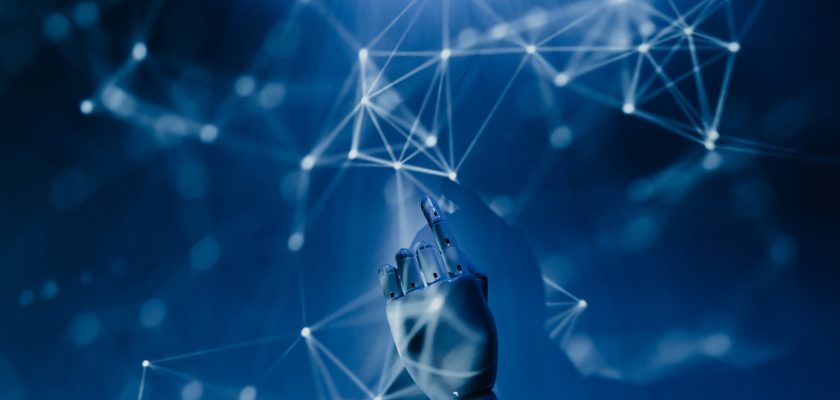Some people are wary about technological growth, including Artificial Intelligence (AI). Sci-fi has not painted a very positive picture of what an AI-driven future will look like for humans. But AI can actually be a great asset capable of revolutionizing entire industries, including education.
Teachers and college professors have a lot of needs and responsibilities to navigate. They are designing course content, grading papers, and actually teaching. In turn, students have tons of essays and homework. Sure, they can get help with the best paper writing services online, but they will still have tons of studying to do. In the future, AI can change the lives of both instructors and learners for the better and revolutionize education.

AI is already making education better
Education is not the most tech-driven field, but it is still affected by technological growth. While they are not as broadly used as one would wish, there are a lot of AI-powered educational applications that can make the education process easier for teachers and more fun and effective for learners.
An example of an interesting educational app that relies on AI is Brainly, an empowering tool for students. It allows them to ask any questions about their course materials or homework and get answers generated by AI. Brainly is a great alternative to tutoring, and it is way faster than writing an email to one’s teacher to ask questions. AI is the most trending technology used in big companies across the globe and to become an expert in it enroll in any Artificial Intelligence Course online.
AI will be used to identify gaps in course curricula
Curriculum designers and teachers go out of their way to ensure that students learn everything they need from the course materials and assignments included in each course. But they are not always successful. Due to the lack of resources, curricula are not updated as often as they ideally should be. And teachers sometimes realize that the content of instruction is to be blamed for students’ lack of knowledge.
AI can help with this. For example, when students take a test, and the majority makes the same mistakes, it means that something went wrong with how this particular rule or piece of information was taught. It is easier to identify such “weak spots” when AI is used to process students’ testing data. Once they are identified, curricula designers and teachers can make the necessary changes and get rid of the gaps.
AI can be used in grading
Automation is both the best and the most terrifying part of AI. A lot of professions will soon grow obsolete. AI can easily substitute humans. This causes understandable anxiety among the people in these professions. For now, teaching is not one of them. No matter how advanced technological development is, it is not going to leave teachers unemployed any time soon.
Nevertheless, AI will definitely automate some of the processes central to education, such as grading. College instructors in some courses have to grade hundreds of student assignments every week. This takes from their ability to focus on improving curricula and actually teaching. When technology is used to grade not only tests but essays, and other types of student homework as well, teachers will probably breathe a sigh of relief.
AI tutors will be available
Not all students perform equally well, and it is perfectly normal. First, their backgrounds predict their performance. For example, students with a higher socioeconomic level tend to do better. This happens because of the opportunities available to them, such as private tutors and more parental support. Also, students have different learning styles and abilities. Some of them work better with traditional curricula than others.
AI tutors can be a great solution, especially for students who cannot afford actual in-person tutoring. So far, while available, AI tutoring programs are only suitable to teach the basics. They are pretty much useless for any tasks that involve critical thinking and creativity. But AI systems are getting better by the day. So teachers and students can expect high-level AI tutoring to become widely available soon enough.
AI will improve testing
Tests are necessary because, in theory, they are one of the very few fair means of assessment. However, one of the major concerns for educators is how inclusive and representative the standardized tests used today are. These tests attract rightful criticism for their inability to account for students’ learning differences. They are not free of bias. For example, research suggests that since tests are more representative of the majority, students who belong to racial and ethnic minorities tend to perform worse on them. This needs to be changed.
AI is capable of identifying bias in testing. But at the moment, relevant research is not funded well enough. Advocates are trying to attract policy makers’ attention to the programs and initiatives that could revolutionalize education using AI. Hopefully, their efforts will pay off, and AI will soon become the tool that makes standardized tests truly fair and representative of test takers’ knowledge.
Eventually, AI can change the teacher’s role
Teachers are one of the professions that people like to use as an example when claiming that AI cannot possibly substitute humans in every job. They are right; no matter how advanced technology gets, teachers are not going anywhere in the foreseeable future. But AI will definitely affect what being a teacher entails.
As discussed, AI can help with grading and thus ease teachers’ burden. AI also has much potential in tutoring and curricula analysis. Basically, AI in education serves the same purposes it does in any other industry. It can help eliminate boring and monotone tasks. As a result, humans will be able to focus on the aspects of their jobs that are truly enjoyable and fulfilling. Teaching is not an exception.
Final Thoughts
Contrary to popular belief, AI is not an enemy. It can facilitate teachers’ jobs drastically by automating grading and course content optimization. AI can also decrease inequities in education by making tutoring available to anyone and eliminating bias from standardized tests. AI-powered apps are also a great extra learning tool for students, and they are already available to tech-savvy learners.


